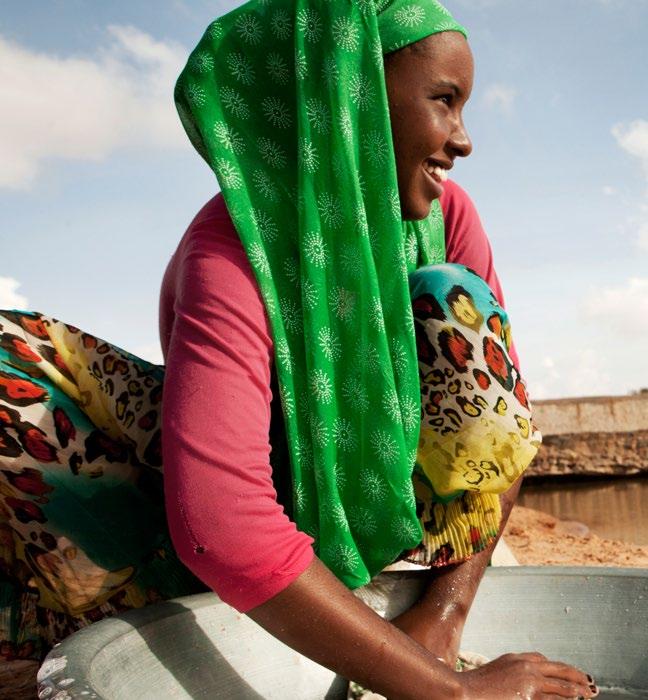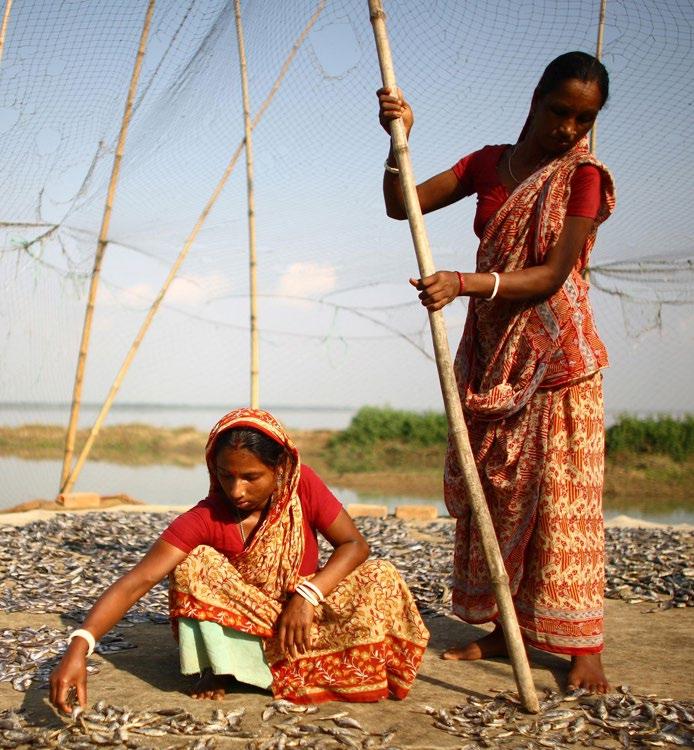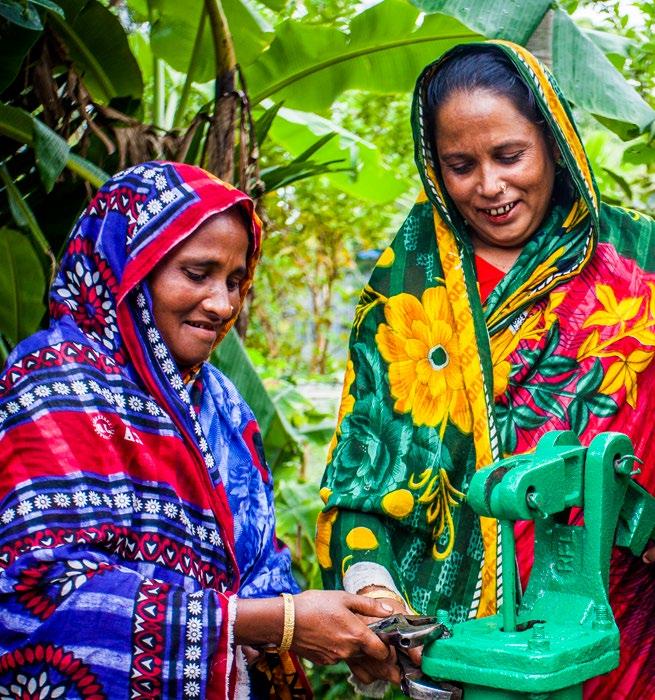Chief Economist
May 2024



May 2024


The International Fund for Agricultural Development (IFAD) is an international financial institution and a specialized United Nations agency dedicated to eradicating rural poverty and hunger. It does so by investing in rural people. IFAD finances programmes
In an effort to enhance its support to rural people to overcome poverty and food insecurity and to foster food system transformation, IFAD is establishing the Office of Development Effectiveness (ODE). This new office will be responsible for managing, measuring, and facilitating the effectiveness of IFAD operations through a focus on results, including in mainstreaming areas. ODE will be responsible for (i) designing operational policies and procedures to enhance the quality of design and delivery of IFAD’s supported operations to drive the kinds of productive, inclusive, sustainable and resilient transformative results that can be scaled to make significant impacts in eliminating global rural hunger and poverty; (ii) assessing the quality of IFAD-financed sovereign and non-sovereign operations, grants, country strategies and operational strategies and policies in terms of overall quality at design and the compliance to countries’ and IFAD’s policies and commitments; (iii) assessing the impact of IFAD’s operations, and monitoring and reporting on the performance of IFAD’s portfolio, including mainstreaming issues; (iv) managing the allocation of IFAD’s resources throughout
and projects that increase agricultural productivity and raise rural incomes, and advocates at the local, national and international level for policies that contribute to rural transformation.
each replenishment cycle; (v) being a knowledge broker by consolidating lessons learnt, identifying and enhancing knowledge, and innovative practices and facilitating their use within the organization; (vi) contributing to positioning IFAD in the global development agenda, particularly the one related to SDG2 and food system transformation; Provides expert guidance on IFAD’s strategic direction and contributes to corporate and operational policy discussions.
The Office works in close coordination with other departments, offices and divisions in IFAD and the Chief Economist, works under the direct supervision of the Vice President of IFAD.
*The structure of IFAD is currently undergoing a recalibration process. The definite set-up of the Office of Development Effectiveness is being finalized and is subject to confirmation of institutional process requirements, which will be confirmed during the recruitment process.
Department:
Office of the President and Vice-President
Division:
Office of Development Effectiveness (ODE)
Salary:
D-2 grade based on the UN salary scale (starting at step 1). Starting salary $154,000 (adjusted by location)
Benefits:
Excellent benefit package including relocation, health insurance and education allowances.
Location: Rome, Italy.
This is a high-level strategic position, thus the need to be based in Rome with limited flexibility on remote work. Hybrid working requires two days minimum in the duty station office.
Frequent travel given there will be global engagement, with increased travel percentage early in the role.
The Chief Economist is responsible for managing an IFAD office and serves on IFAD’s senior management team. The main focus of the Chief Economist is on strategic leadership of IFAD development effectiveness, innovation and management. The incumbent is responsible for the management and delivery of the Office’s programme of work within an allocated budget.
The Chief Economist, manages and directs the human, financial and material resources of ODE and holds responsibility over the effective and efficient delivery of its programme. The incumbent provides authoritative and technical advice to senior management on the Fund’s Strategic Framework, strategic planning, policy, and office programme and operational management. Chief Economists, provide inputs and advice based on ODE products at the request of the President, vice President and senior management.
The Chief Economist is a member of the IFAD Executive Management Team with a corporate responsibility for the Fund.


The Chief Economist leads the work of IFAD’s Office of Development Effectiveness by providing strategic leadership and guidance to staff on IFAD’s mandate. The incumbent also guides the direction in the development and interpretation of major policies, regulations and rules, and systems that govern the work of the office and ensure they support office goals and objectives within the overall Fund mandates and strategies. The Chief Economist also serves as the chief Quality assurer for the IFAD programmes and projects, as well as a trusted business/ programme advisor with a significant role in authoritative policy advice within the Fund at the senior management level as well as in policy dialogue in their representational activities.
The Chief Economist acts as a champion for change, promoting and endorsing solutions to intractable challenges and has an entrepreneurial and creative approach to developing new, innovative ideas that will stretch the organization and push the boundaries within the industry. They encourage evidence-based knowledge generation and its dissemination in all activities and contribute to resource mobilization activities and to evidencebased policy making at the international, national, and local level to advocate for the extreme poor and food insecure in rural areas. The incumbent advocates the Organization’s policy positions and expands the Organization’s external visibility and positioning. In order to promote organizational change and keep abreast of technology advancement they set clear priorities for the Office and lead by example.
The Chief Economist leads and contributes to the corporate development effectiveness agenda and plans, monitors and leads IFAD’s collaboration with its institutional partners and member countries on resource mobilization and corporate partnerships, in accordance with agreed priorities, approved programme/ budgets, strategic objectives and corporate policies. They promote the development of rigorous evaluations, reviews, analysis, and lessons to inform IFAD’s lending and non-lending portfolio (including country programme strategies, policy engagement initiatives, etc.), particularly on issues surrounding food security, agriculture, and rural development. The incumbent oversees the development and implementation of the annual programme and budget of the Office in the context of IFAD’s Strategic Framework and IFAD Replenishment Commitments and provides guidance in the assessment and reporting of corporate impacts of IFAD’s funded projects.
The Chief Economist develops and maintains political and business relationships with key donor Member States and strong collaboration with strategic partner organisations, including borrowers, bilateral and multilateral development agencies, UN agencies, funds and programmes, international financial institutions (IFIs), non-governmental organizations and academic institutions, which among other partnership priorities, can help drive mobilisation of resources from the financial sector and private sector as desirable. Chief Economist serve as designated representative of the Fund in official United Nations committees and networks, and in IFls, multilateral and bilateral meetings, symposia, fora and Global conferences upon request of the President, and build organizational networks with peers in major private, public and international institutions.

The Chief Economist is responsible for ensuring the transparent, equitable, and efficient management of IFAD’s resources, including human, financial, and material resources. This includes managing staff through workforce planning, recruitment, performance management, and career development. They are also responsible for managing the division’s budget, ensuring accountability and fiduciary integrity. Additionally, they are responsible for managing material resources and promoting knowledge and content management to achieve innovative outcomes and cost-effective processes. The Chief Economist also leverages information technology to improve business results, reporting processes, and client services.
Given that the Office of Development Effectiveness is a new Office in IFAD’s corporate structure, the Chief Economist is responsible for leading the establishment of the office, including fine-tuning of roles and responsibilities and the definition of specific lines of collaboration to ensure smooth vertical and horizontal collaboration with other IFAD departments and offices to foster smooth operational and knowledge sharing.
In parallel with the establishment of the Office, the Chief Economist is responsible for providing intellectual leadership and an authoritative contribution to the integration of knowledge and innovation into IFAD’s operations and overall business model.
The key responsibilities for the Chief Economist, include:
• Leading the design of operational policies and procedures and assessing the quality of design of IFAD’s supported operations and policies for improved development results and sustainability of benefits. This includes leading on:
– Operational policies and procedures for country strategies and operations
– Compliance of key operational building-blocks, such as procurement and Social, Environmental and Climate Assessment Procedures (SECAP) procedures, and corporate commitments
• Managing operational resources in line of corporate policies and priorities as well as tracking results and performance including mainstreaming priorities. This includes overseeing:
– Management of the Performance-Based Allocation System (PBAS) and Borrowed Resource Access Mechanism (BRAM)
– The system for monitoring and reporting on the delivery of the programme of loans and grants
– Management of the self-evaluation architecture, corporate reporting on operational performance and results and efforts for greater transparency
– Coordination of the development of corporate ICT systems and databases for operations
– Management of external reporting with the Independent Office of Evaluation (IOE) and other external partners
• Advising and overseeing the results tracking system, facilitating the incorporation of knowledge and innovative practices into the operations, and the assessment of the impact of IFAD’s supported operations. This includes overseeing:
– Monitoring and evaluation and conducting impact assessments to understand whether changes in the lives of project participants can be attributed to the project itself and report on the overall impact of IFAD’s portfolio
– Provision of evidence-based support and strategic guidance on innovations that can enhance operations and institutional function
– Brokering the knowledge, innovation, and lessons learnt and facilitating the incorporation of knowledge management from country strategies and first stages of design through implementation and assessment.
– Liaison points for strategic planning and technical content for food system transformation and other global for a
• The Chief Economist leads the secretariat of the arms-length analytic and technical reviews of the design quality at entry of country strategies and operations and acts a secretary of the Operational Strategy and Policy Guidance Committee.
This role will likely manage 4-5 line reports (to be confirmed), each with significant departmental responsibilities. Thus, high level, institutional senior leadership experience is a requirement. The individual will be skilled in developing internal business partnerships reducing silos within the departments. They will be an empowering leader, able to build and develop high performing teams with a high degree of emotional intelligence. They will also be able to provide external leadership capacity in representation, stakeholder engagement and thought leadership.
Given this is a programmatic position, it requires strong operational and programme management experience at division-level, combined with substantial financial knowledge (blended finance). An agricultural or rural development background is not mandatory (but is desirable). The individual will be well versed in financial and programmatic monitoring and evaluation, with an agency similar in scale of funds marshalled.
Ability to provide expert guidance on IFAD’s strategic direction and contribute to corporate and operational policy discussions.
Someone beyond Chief Economist theoretical knowledge (analysing, collecting data), someone who has the practical experience of translating policies in the field, can understand delivery of programmes & projects, and understands practical issues and how to improve policies.
The incumbent will need to be highly motivated and curious, with a more corporate approach, analytical and strategic thinking skills to analyse data from a variety of sources, able to connect the dots and have an impact on the field. Not an “office bureaucrat”.
The fact that IFAD is a UN agency financial institution and that the role requires substantive relevant experience at an international institutional level, candidates are most like to come from Multilateral Development Banks and Organisations, International Financial Institutions, Bilateral Organisations, UN agencies and other Development Finance related Organisations and Funds.


Chief Economists establish IFAD’s priorities and provide leadership to division-level programme and operational management activities, ensuring a results-based approach to meeting assigned goals and objectives.
Leadership activities include the optimal utilization of human, financial, technology, and material resources for greater efficiency and effectiveness.
The Chief Economist, ODE is responsible for IFAD’s operational effectiveness, providing strategic leadership and assisting the President and Vice President.
The Chief Economist works with the executive management team to establish operational goals and strategies, overseeing their implementation to ensure IFAD’s sustainability in delivering quality assessments in support of IFAD-funded programmes and projects.
Chief Economists are responsible for building and maintaining strong working relationships both within and outside of IFAD. Internally, they provide strategic advice to the President and Vice-President and collaborate with other departments, offices and divisions to ensure effective coordination of programme planning and activities. Externally, they develop strategic partnerships with a range of institutions, including borrowers, development agencies, UN agencies, and non-governmental organizations, for the purpose of programme
cooperation, knowledge sharing, policy dialogue, and resource mobilization. Chief Economists also represent IFAD in official committees, meetings, and conferences, and build organizational networks with peers in major private, public, and international financial institutions.
As a member of IFAD’s senior management, the Chief Economist, supports the President and Vice President in providing vision and oversight, as well as reporting to governing bodies.
Organizational Competencies
• Building relationships and partnershipsBuilds and maintains strategic partnerships internally and externally
• Communicating and negotiating - Acquires & uses a wide range of communication styles & skills
• Demonstrating leadership - Leads by example; initiates and supports change
• Focusing on clients - Contributes to a client-focused culture
• Learning, sharing knowledge and innovating - Challenges, innovates & contributes to learning culture
• Managing performance and developing staff - Manages wider teams with greater impact on others and on the organization
• Managing time, resources and information
- Coordinates wider use of time, information and/or resources
• Problem-solving and decision-making
- Solves complex problems and makes decisions that have wider corporate impact
• Strategic thinking and organizational development - Staff in management and/or strategic leadership roles
• Team working - Fosters a cohesive team environment
Education
• Level - Advanced university degree from an accredited institution in Economics or related field, preferably a PhD. Degree must be from an accredited institution listed on the World Higher Education Database.
• Relevant certifications (ICCE) would be an asset.
Experience
• At least 15 years of substantive relevant experience at an international level in an institution, which could include multilateral development banks and/or international financial institutions, UN agencies or other development financerelated organizations.
• Demonstrated leadership experience with strategic vision and proven skills to manage a complex organization with staff of diverse cultural backgrounds in multiple locations.
• Extensive and proven managerial experience with a focus on people management.
• Progressively responsible management experience in senior level positions.
Languages
• Required: English (4 - Excellent)
• Desirable: French, Spanish and/or Arabic (3 – Good)


• Economic evaluation: Know-how relevant to specific role in Evaluation roles (e.g. Monitoring and managing evaluation processes and methodologies, carrying out Programme/Project evaluation, Impact evaluation, Corporate-level evaluation)
• IFAD governance & mandate: In depth knowledge of IFAD`s governance structure, mandate, strategic priorities and technical work
• Policy making: Ability to provide expert guidance on IFAD’s strategic direction and contribute to corporate and operational policy discussions
• IFAD partners: Knowledge of IFAD’s partners’ functioning and mandate, such as the public sector (e.g. governments and policy, institutions and system), non-state actors (NGOs, CSOs, Foundations, etc.) and private sector actors
• Strategy implementation: Ability to lead and manage the development and implementation of medium to longer-term strategies for IFAD / for respective divisions
• Policy dialogue: Know-how in the representation of IFAD as a trusted and strategic partner, advocating and promoting IFAD’s mandate and vision; effective consultations with IFAD counterparts - like ministries and governmental bodies at all administrative levels, donors, civil society
• Change management: Role modelling, anticipation of key risks & conflicts and formulation of contingency plans/solutions, action-oriented
• Confidentiality & Discretion: Establishes self and division as trusted advisor to internal stakeholders by maintaining high level of discretion and confidentiality in assignments; demonstrates sound judgement when dealing with sensitive and/or confidential matters; drives good governance and is a “Culture Carrier” demonstrating IFAD institutional conscience through his/her work.
• Corporate approach: Ability to bring in corporate vision and priorities into one’s area of work (e.g. budgeting going beyond simple budgetary considerations, taking into account strategic priorities)
• Integrity and ethics: Strong emphasis on acting with honesty, not
tolerating unethical behaviour, demonstrating equity, impartiality and sensitivity in exercising authority and interacting with staff, and other stakeholders. Conduct must be guided by IFAD core values, the Code of conduct and a high sense of ethics.
• Leadership: Group thought leader, sought out by others and providing mentorship and effective guidance to others; Ability to build trust, inside and outside the organization by acting as a role model for IFAD’s core values and competencies, and to provide a clear sense of direction, mentorship and effective guidance to the team, strategizing the IFAD’s goals, giving the vision, empowering the team and ensuring a positive environment for all.
• Political acumen: Ability to conduct sound political analysis and understand complex environments, providing options and advice
• Specialized communication skills: Ability to negotiate on behalf of IFAD and drive for creative and pragmatic solutions in complex negotiations with key partners, both public and private sector
• Evidence-based policy: Know-how in the formulation of concrete and actionable policy recommendations based on hard evidence (going beyond simple data interpretation)
• Analytical and strategic thinking skills: Outstanding ability to analyze and synthesize qualitative and/or quantitative information from a variety of sources and filter out key insights and recommendations.
• Quantitative skills: Significant understanding of the collection and quantitative analysis of impact assessment and operational data
• Operational experience: Significant experience in working with operations in the context of an International Financial Institution
• Results management: Strong understanding of managing for results in the context of an International Financial Institution
• Social & Environmental Safeguards: Know-how in Social & Environmental compliance in the context of an International Financial Institution
All correspondence, at this stage, should be via Oxford HR. To apply for this post, click on the “Apply” button on the job advert page, complete our online application form, and submit your CV and cover letter as two different documents, which should be prepared before applying as they will be considered in the application process. The cover letter should be no more than two pages long and explain why you are interested in this post and how your skills and experience make you a good fit.
The document should be saved in PDF in the following format: Your First Name-Your Last Name-Document Name-Date (mmyy) e.g., Pat-Jones-CV-0524-IFAD or Pat-JonesCoverLetter-0524-IFAD.
Timeline Closing Date: 10th June 2024 First stage interviews: TBD Final interviews: TBD
All candidates will receive an update regarding their application after the closing date. We advise candidates to add the role email to their safe senders list and regularly check their spam folder.
Equality and diversity are at the core of IFAD’s values. Staff are expected to work collectively and individually to promote a constructive and sensitive approach to others from a variety of backgrounds, where the work of others is valued and respected.
If you have any queries on any aspect of the appointment process, need additional information, or would like to have an informal discussion, please email at jsawyer@oxfordhr. com in the first instance.


Exceptional leaders can inspire change and propel purpose-led organisations towards reaching their worldchanging goals. Finding such leaders can be a challenge; and yet their transition into leadership is vital to an organisations mission and success.
Oxford HR is a global leadership consultancy dedicated to searching for and supporting remarkable leaders and teams in purpose-led organisations.
We understand the nuances of purpose-led leadership because we’ve worked in organisations across the breadth of the sector ourselves. We’ve also worked with such organisations since 1995; so we appreciate just what benefits impactful people can bring.